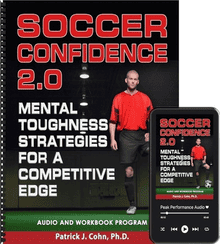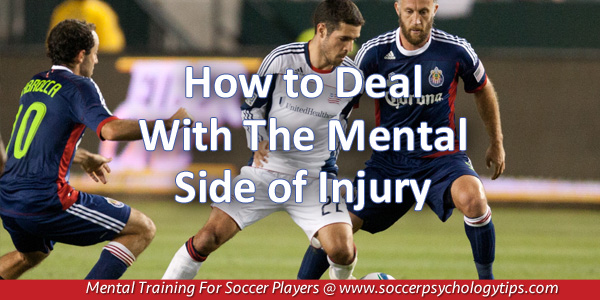Overcoming The Fear of Reinjury
Playing competitive soccer involves dealing with the risk of injury and sometimes recovering from injury.
Hard tackles, sharp cuts, head balls, dangerous kicks and awkward falls can lead to unfortunate injuries and a host of consequences to wade through.
However, the costs of injury are more than physical with the mental component being much more difficult to manage.
You can probably recall a time when you were injured and all the issues you were forced to deal with:
- “Will I start again?”
- “How will I deal with the pain?”
- “How long before I can return to practice?”
- “What are the percentages of reinjury?”
- “Will I be able to play at the same level?”
- “How will I be able to stay in shape?”
- “Will this injury cost me my career?”
The physical pain many soccer players can deal with but the mental strain is often torture for athletes.
Tom Elliott, forward for Millwall FC of The Championship League, signed his first professional contract as a teenager. Not far into his career, Elliott dealt with injury issues including hamstring problems and an avulsion fracture.
These injuries threatened to derail Elliott’s career and, to make matters worse, one coach publicly criticized Elliott saying, “[Elliott] is always injured and he will not play with any bit of pain so he has to grow up.”
Elliott bounced around from team to team and wondered if he would ever get his career back on track. The ordeal was mentally grueling for Elliott.
ELLIOTT: “I didn’t want to really play football. I didn’t really know what I wanted to do. You just can’t think straight. You’re in auto-pilot, wishing days away. You’re not in a good place.”
The fear of re-injury was a huge hurdle for Elliott, “I used to be frightened of my hamstrings going. It was hard for me – playing and not worrying. Mentally I was quite weak.”
With his career hanging in the balance, Elliott decided he needed help in order to deal with the mental aspects of injury, so he started talking to a sport psychologist.
ELLIOTT: “[My sport psychologist helped me] leaps and bounds to stop thinking about my body and worrying about things – to be focused on football and what’s important for me.”
With his sport psychologist on board as a member of his support team, Elliott had a career best season, at the age of 26, with 15 goals for AFC Wimbledon during the 2016-17 campaign.
It’s not enough to just do physical therapy to deal with an injury.
If you ONLY focus on physical rehabilitation after an injury, you are doing yourself a great disservice.
In order to bounce back from an injury and play even better than before, you MUST deal with injury in both physically and mentally.
A Tip for Dealing With the Mental Aspects of Injury:
Acknowledge your fears when returning. The first step in overcoming your fears is to admit you have them.
Write down your fears… “I am afraid I will not be the same player,” “I fear I will get re-injured,” or “I am afraid my conditioning will set me back.”
These are very real fears but if you confront them, it will diminish their intensity.
“Is it true that I will not be as good as before my injury? Are there any ways I can improve my game or change the way I play to be more productive on the field?”
A strong mental approach to injury and overcoming mental scars can put you back on track faster after injury rehab.
Learn all my mental game strategies for mental toughness in soccer with Soccer Confidence CD and workbook program:
Related Sports Psychology Articles
- Peak Mental Conditioning for Soccer
- How to Train Yourself to Mentally Reset during a Soccer Game
- Embracing the “Live and Learn” Mentality?
- Subscribe to The Sports Psychology Podcast on iTunes
- Subscribe to The Sports Psychology Podcast on Spotify
Download a free sports psychology report to improve your mental game!
Learn more about our one-on-one mental game coaching.
Boost Confidence in Soccer

“Soccer Confidence 2.0” 3-CD and Workbook program is the most comprehensive mental game program we’ve offered to the public. We’re virtually giving away all our mental game secrets for the incredibly low price of only $197.00 including the free bonuses!
“Soccer Confidence” is a complete brain dump of the TOP NINE mental training sessions we teach our soccer players to help them boost their mental game and improve consistency – from how to mentally prepare for games to performing under pressure to building unstoppable confidence.

